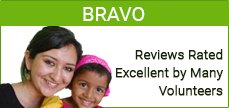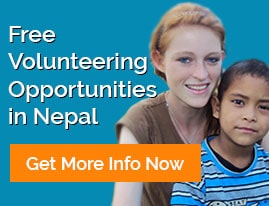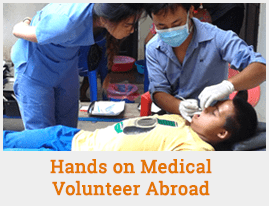VOLUNTEER IN PANAMA
' I LOVE this experience in chitwan for though short period! '
Xue Ying Fiona WangPeru FAQs
Disclaimer: The information given in this FAQ's page is generic. You should verify critical information such as visa-related issues, health and safety, customs and transportation with the relevant authorities prior to traveling. Please be aware that information given in FAQ's may change at any time. In effect, we accept no responsibility for any loss, injury or inconvenience sustained by anyone resulting from this information. For the latest updates, please contact us or our in-country coordinator(s).
General Information
The founder of RCDP has been involved in volunteer abroad business for the last 10 years. During this time, he has worked with more than 2000 volunteers and more than 200 universities, colleges, and schools groups.
Working with inspiring college students and humanitarian volunteers was very motivating as well as very enjoyable and presented many exciting learning opportunities. This experience encouraged him to start his own volunteer abroad program where affordable prices, premium programs and meaningful contributions to deprived communities would become the key components of the programs.
With this in mind, while setting up volunteer and travel abroad organization, we have selected many safe and culturally rich destinations where volunteers can make meaningful contributions, immerse in local culture, and get enriched from volunteer abroad experience. In each destination, we have carefully selected projects, host families, travel coordinating staff, and placed local support staff. We have provided them with extensive training to manage the program with professional services that will be delivered with care and respect for all volunteers. We are now proud of our coordinators, host families, host projects, and staff as all of them have at least 4 years of working experience with international volunteers. To meet your expectation, they are committed to working hard, delivering professional services, and turning your volunteer abroad experience into a memorable journey.
Our volunteer projects in Panama are located in such exciting places like Arraijan, Chitre, Cambutal and Isla Canas. The programs offer unique opportunities to help underprivileged while simultaneously exploring the spectacular diversity of wildlife and marine life all contained within the bountiful borders of Panama.
Information on Application
Starting application
There are two options available to those applying for volunteer positions in Guatemala programs:
- Apply online (http://rcdpinternationalvolunteer.org/apply.php)
- Download the application form. Then, fill it out, and mail to RCDP.
After submitting application
Once RCDP receives your application, it will immediately be forwarded to Panama for processing. Our Panama In-Country coordinator will then carefully review your application to ensure you get placed in the project that matches your criteria and your qualifications.
Duration of the application process
Once the Panama In-Country coordinator finalizes and forwards us the detail, we will immediately send it to you. The whole process normally takes 1-2 weeks. However, this can sometimes take longer.
You will also find an invoice requesting you to pay the program fee along with the placement details.
Preparation
Once you receive the placement details, you can even call our Panama office directly and speak to our In-Country coordinator and any questions that might you prepare for their trip.
Preparation for Panama trip includes: reading about Panama, vaccination, visa arrangement, booking tickets. If you experience ANY problems, please call RCDP office.
Once you purchase air tickets, they should immediately submit the flight details to BOTH RCDP and Panama office.
Information on Airport and Arrival
Arrival Airport
Please arrive at Tocuman International Airport (PTY) in Panama City, Panama.
One of our representatives will be waiting for you in the arrival lounge holding a placard with your name on it. This will happen without fail when you pass your travel itinerary to our office. If you want to be absolutely sure, you can call your Panama office and talk to our In-Country coordinator.
Flight Delayed or Missed
If your flight gets delayed or if you miss your flight and book yourself on a later flight, please let us know immediately by either calling our office. You must try to call first and then email the details if possible. Look at your placement details for all the contact information.
If you cannot make any contact and no one receives you at the airport, look at your placement details, hire a taxi and go to the hotels recommended on it
Arrival Day
Volunteers coming to Panama are suggested to arrive one day before the start of program. If volunteers arrive more than one day earlier or remain after the close of their program, they will be responsible for their own for providing their own accommodation and meal.
Information on Accommodation and Meal
RCDP will look after your entire need during your volunteering program. Volunteers will either stay in a hostel or with a host family, depending on the project they choose. Typically, three (3) local meals are served a day by the host families. If you need to pack your food, that can be arranged. For vegetarian appetite, the host families also provide the option of vegetarian meal but please inform us well in advance.
You will share bathrooms and kitchen with family members. Many houses in Panama do not have hot water but you will not need it as the weather in Panama is very hot all year round. You will have the ability to do your laundry in the house or the host family may offer to do it for you. You may have to pay little extra for that service.
During the volunteer work, RCDP keeps in touch with our volunteers. Our staff will visit volunteers every 2 weeks (if possible). Volunteers are always welcome to visit our local office and talk about anything they like. If volunteers’ are further afield, we communicate with them by either email or phone.
Information on Visa
Countries whose citizens have passports valid for at least 6 months upon entry do not require a visa to enter Panama include (amongst others) Andorra, Argentina, Austria, Belgium, German, Ireland, Malta, Netherlands, Portugal, San Marino, Singapore, Sweden, Switzerland and United Kingdom. Citizens of some Australia, Canada, Japan and US may enter Panama with a tourist visa that is stamped on arrival. When arriving by airplane, as of May 2008, entry requirements are proof of:
- a return ticket out of Panama
- possession of US$500 in cash or travelers' checks
- Recommended vaccination for yellow fever--only if coming from a country where yellow fever occurs (includes most of South America and Africa but not USA).
Information on Health and Safety
Visit the sites listed below and acquire as much information as possible. Remember there is no harm in knowing more when it comes to health and safety.
- WHO website for international travelers (http://www.who.int/csr/ihr/en)
- Centers for Disease Control & Prevention
1600 Clifton Road , NE
Atlanta , GA 31333
(888) 232-3228
(888) 232-3299 - fax information service - Health Canada Online
- Canadian Department of Foreign Affairs and International Trade and Travel Report
- U.S. State Department & Consular Information Sheets
Room 4811
2201 C Street NW
Washington , DC 20520
(202) 647-5225 - Travel Health Online
- Travelers' Health
General Health Tips for Volunteer in Panama
- Publicly available water is not considered safe to drink in most of Panama. When traveling to the beaches or very rural areas, drink only bottled or boiled water, or carbonated (bubbly) drinks in cans or bottles. Tap water should not be considered safe at the beaches nor fountain drinks and ice cubes.
- Buy bottled water from proper outlets. Be wary of fake bottled water which are available everywhere. Always make sure the seal is not broken and the cap not tampered with.
Avoid eating food from road-side stalls. Eat unpeeled fruits and avoid fresh salads, especially in small hotels. If you are forced to eat food at some place that you have doubts about, make sure the food is served hot. - Avoid eating food from road side stalls/vendors. Don't eat unpeeled fruits or fruits that have already been cut by unknown handlers on the street. If you are forced to eat food at a place that you have doubts about, make sure the food is served hot.
- If you require any prescription drugs, bring enough for the duration of your stay in Panama. They will need to be carried in their original prescription bottle and the prescription must be in your name.
- Please carry a small health kit which should include medicines to cure upset stomachs, some antiseptic cream, hydration powder, deer mosquito repellant, sun block, band aids, etc.
Information on Vaccinations
Please visit Center for Disease Control's website ( www.cdc.gov ) for traveler's health recommendations. Your travel doctor will be knowledgeable about current epidemics and should be consulted.
Recommended Vaccinations and Preventive Medications
The following vaccines may be recommended for your travel to South America including Peru. Discuss your travel plans and personal health with a health-care provider to determine which vaccines you will need.
- Routine :Recommended if you are not up-to-date with routine shots, such as measles/mumps/rubella (MMR) vaccine, diphtheria/pertussis/tetanus (DPT) vaccine, poliovirus vaccine, etc.
- Hepatitis A or immune globulin (IG). Recommended for all unvaccinated people traveling to or working in countries with an intermediate or high level of hepatitis A virus infection where exposure might occur through food or water. Cases of travel-related hepatitis A can also occur in travelers to developing countries with "standard" tourist itineraries, accommodations, and food consumption behaviors.
- Hepatitis B Recommended for all unvaccinated persons traveling to or working in countries with intermediate to high levels of endemic HBV transmission, especially those who might be exposed to blood or body fluids, have sexual contact with the local population, or be exposed through medical treatment (e.g., for an accident).
- Typhoid vaccine. Recommended for all unvaccinated people traveling to or working in Mexico and Central America, especially if staying with friends or relatives or visiting smaller cities, villages, or rural areas where exposure might occur through food or water.
- Yellow Fever
Requirements: Required if traveling from a country with risk of YFV transmission.
Recommendations:Recommended for all travelers ≥9 months of age traveling to all mainland areas east of the Canal Zone, encompassing the entire comarcas (autonomous territories) of Emberá and Kuna Yala, the entire province of Darién, and areas of the provinces of Colón and Panamá that are east of the Canal Zone.
Not recommended for travelers whose itineraries are limited to areas west of the Canal Zone, the city of Panama, the Canal Zone itself, the San Blas Islands, and the Balboa Islands.
Information on Monetary Issues
Currency
Panama uses US Dollar
ATM/Debit Card/Debit Card/Travelers Checks
ATM machines are available at various regions throughout Panama, especially in Panama City, Arraijan, Chtire.
Budget
You can get by with $25 a day provided you are careful in taking your money out. Accommodation and meal during your project is free but if you want to explore Panama and shop, budget accordingly.
Information on Field Support and Supervision
We keep in touch with our volunteers. Our staffs visit volunteers every 2 weeks. You are encouraged to contact us if you want to speak with us on anything. You can also visit us. You will be provided with all the contact information.
If you work in projects that are far from Arraijan, you will be contacted by email, phone and fax.
Information on Communicating
Internet cafes are around in Arraijan, Chitre and Tonosi.
You can also use international phone cards to call home. You will be provided with full contact details of our office in Panama. You are encouraged to call us should you want to do so. In addition, our program staff will visit you regularly to check upon you.
Information on Weather
Information on Materials to Bring
Most daily use items are available in Panama at a reasonable price. However, we suggest volunteers pack the following things:
- Camera
- Mobile phone NOTE: only bring cell phones that have multi-national coverage. You cannot switch to a new SIM card here, as the local phone system requires resident status and a receipt for your phone purchase.
- Sleeping bag-only necessary if you wish to actually camp-out
- Mosquito and insect repellents
- Sunscreen, SPFs
- Work gloves (if joining conservation or farming project)
- Books about Panama
- Map of Panama
- Toilet paper
- Sheets
- Pillow
- Soap
- Toothbrush/paste
- Toiletries
- First aid kit
- Flashlight
- Sunglasses
- Shoes/boots (for work and travel)
- Towel
- Hot weather clothing, but conservative
- Jeans, pants or skirts
- Swimsuit
- Long-sleeve shirt and jacket for cooler areas
- Jeans or pants or skirts for Panama City
- Raingear, especially during the rainy season
 1-2543048951
1-2543048951


